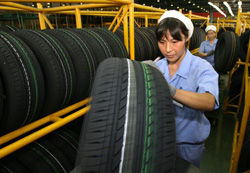
Business Listings
- Auto Dealers
- Batteries
- Body Works
- Detailers
- Electronics
- Finance
- Insurance
- Parts & Accessories
- Repairs
- Tires
- Towing
- Transmission Repairs
- Windshield
Traffic Department Info
Choosing the Right Tires & Wheels For Your Vehicle
 You can have the most powerful engine, the most sophisticated transmission, the most elaborate suspension, and every other automotive widget known to mankind, but it‘s not worth a thing if the tires and wheels are mediocre. It's actually quite amazing that while crummy tires can hurt a great car, great tires can do wonders for a less-than-fantastic car. In other words, there are some instances where tire technology is way beyond many of the cars on the road.
You can have the most powerful engine, the most sophisticated transmission, the most elaborate suspension, and every other automotive widget known to mankind, but it‘s not worth a thing if the tires and wheels are mediocre. It's actually quite amazing that while crummy tires can hurt a great car, great tires can do wonders for a less-than-fantastic car. In other words, there are some instances where tire technology is way beyond many of the cars on the road.
Our purpose is to try and put a finer point on some of the basics of wheels and tires, and how to select them. Think of it as a wheel-and-tire primer that will provide you with useful facts when it comes time to make a replacement tire purchase or a wheel-and-tire upgrade.
Choosing the tire that's right for you involves numerous considerations. But to make the process less scary, keep these two simple guidelines in mind when considering tires.
- Know your expected needs and driving uses. This consideration is important to overall driving enjoyment and a well-run tire shop will help you determine your tire needs before you pay your money.
- Find a source or store that you trust enough to recommend the type of tire that fits your needs. Remember, the salespeople don't know your needs, you have to tell them. If they're good, they'll ask you the right questions to come up with the right tire.
You might be wondering what some of the questions could be. Here's a list of what you should think about before entering a tire store:
- Tread life considerations: What's your idea of how long a set of tires should last? Actual performance of the tire can vary significantly depending on conditions, but the tire's UTQG tread life number can help you get in the ballpark as to how long a tire will really last.
- Wet weather requirements: Most of us live in a climate where inclement weather is a factor at least part of the time. Consider purchasing more capable wet-weather tires for tropical climates with lesser quality roads and maybe even swap tires in the dryer months.
- Speed rating: Speed ratings signify the safe top speed of a tire under ideal conditions. For just about any street car, a V-rated tire will be more than adequate, unless the car will actually go faster than 150 mph. Usually, most ultra-high performance handling tires have a speed rating of at least V, so while you might want the ultimate handling of that type of tire, be aware that part of what you're paying for (the speed rating) is something you'll never use.
- Ride Quality: A low-profile tire such as a 50 or a 40-series looks great, but can be harsh over bumps or potholes when compared to a 55 or 60. In general, a lower profile tire also exposes the wheel to damage more easily. Lower profile tires also have stiffer sidewalls, which improves handling but increases rides harshness.
- Noise: Some tread designs are noisier than others and it varies significantly between tire brands and tread designs. If most of your driving is on lower-speed city streets, then this won't be much of a factor. But for highway driving, you'll want to consider your options, especially if you're driving an SUV on pavement most of the time. A good salesperson will be able to tell you which tires are quieter among those you're considering; even those of the same make that are in a different line can vary in road noise.
That's the basics on tires, now we'll move on to wheels. Tires wear out, but wheels don't, so why would you want to change wheels? For many there's no reason to, especially when you look at some of the very attractive wheels that come on many of today's cars as original equipment. But, of course, some cars have hokey wheels that need to be turned into flowerpots. As such, one of the two main reasons most people consider a wheel change is simply for looks. A better-looking wheel makes a world of difference on many cars and trucks.
Besides appearance, the plus concept is a key reason to switch wheels. Plus sizing your wheels and tires is the best way to improve both the performance and appearance of your vehicle. By using a larger diameter wheel with a lower profile tire it's possible to properly maintain the overall diameter of the tire. By using a tire with a shorter sidewall, you gain quickness in steering response and better lateral stability. Besides plus sizing, other factors should be considered before shelling out big bucks for wheels. These days it's tough to buy truly bad wheels and tires. While some wheels are lower quality than others, as is also the case with tires, there are so many good ones out there that you will usually have several possibilities from which to choose.








